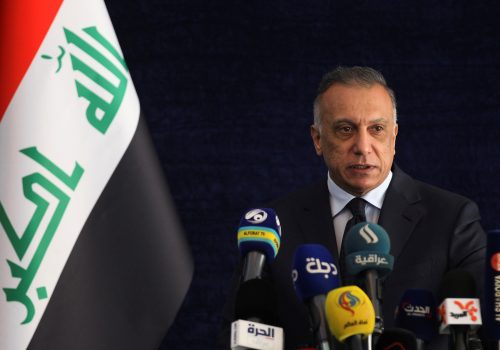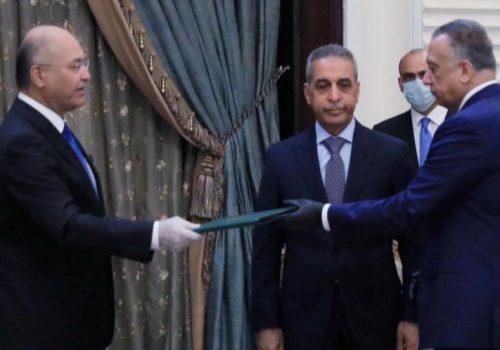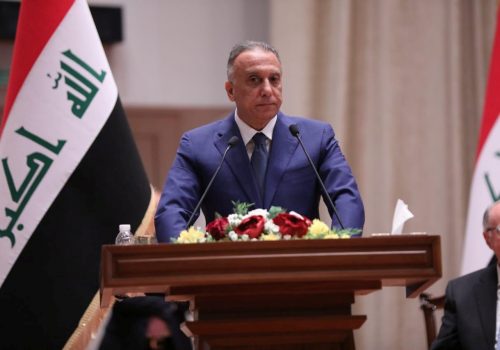Iranian foreign minister’s visit aggravates Iraqi-Saudi rapprochement
All the details were carefully planned for Iraqi Prime Minister Mustafa al-Kadhimi’s first foreign tour since taking office. Saudi Arabia, strongly supported by the United States, was selected as the first destination for the untested Iraqi leader, who is facing insurmountable challenges on the home front. Kadhimi is eagerly looking for quick accomplishments to build a political record and secure his premiership, which started as a temporary appointment with a specific mandate to finalize immediate political reforms and set the stage for early general elections. On governance, expectations were low, given the international crisis of the coronavirus pandemic and the falling of oil prices that has left Iraq on the verge of economic collapse.
To set the stage, an Iraqi delegation headed by Deputy Prime Minister Ali Allawi reached Riyadh on Sunday, one day prior to the arrival of the prime minister. Allawi, who previously visited Saudi Arabia on May 22—at the time as finance minister and acting oil minister—conducted a round of talks with Saudi officials with a focus on economic cooperation, trade, and the coordination of oil production between OPEC’s top two oil producers. Since former Prime Minister Haider al-Abadi’s term in office (2014-2018), Iraq and Saudi Arabia have created a joint coordination council to normalize their political and economic relations. This effort led to several agreements, some of which have been partially implemented, while others remain at the planning stage. Allawi’s second visit was meant to set the stage for a series of economic and investment agreements to be signed during Prime Minister Kadhimi’s visit.
The trip to Saudi Arabia was preceded by substantial press coverage and political support from Saudi Arabia and the United States. A highlight of the trip would be the renewal of plans to connect Iraq to the electricity grid of the Gulf Cooperation Council (GCC). A joint US-Iraq-GCC statement was issued by the US State Department on July 16, pledging that the “United States is committed to facilitating this project and providing support where needed.” The statement omitted the fact that this project was already underway. Signed by former Prime Minister Adil Abdul Mahdi’s government in September 2019, Iraq completed its obligation to build the required infrastructure on its side of the border in June 2020, while the GCC has yet to finish its side of the work. This important project aims to provide Iraq with a portion of its electricity demand—albeit, not immediately—with some experts estimating a five-year timeline before it becomes fully operational. Meanwhile, Iraq remains partially dependent on electricity and gas imports from Iran, limiting Iraq’s ability to comply with the United States’ “maximum pressure” campaign against the Islamic Republic.
On the other side of Iraq’s regional entanglement is Iran, a country that has spent the last seventeen years establishing special relations at the political, economic, and societal levels across Iraq. In recent months, Iran has seen its advantage in Iraq in alarming retreat. First, there was the open hostility toward Iranian interests and those of Iran’s Iraqi friends and associates, particularly in the holy Shia cities of central Iraq. Then, came the most dramatic development in the escalation of the US-Iran conflict that led, on January 3, to the killing of the deputy commander of Iraq’s Popular Mobilization Forces, Abu Mahdi al-Muhandis, and Iranian General Qassim Soleimani, Commander of the Quds Force. The latter handled, among other tasks, Iran’s security dossier in Iraq. The US unilateral military action, which strained US-Iraqi relations, prompted a vote in the Iraqi Council of Representatives that called for the withdrawal of US troops from Iraq—a demand that is still on Prime Minister Kadhimi’s table. Iran’s latest setback has come in the formation of the new Iraqi government, when its Iraqi allies could not appoint a prime minister of their choice and were forced to make a significant compromise by voting to confirm Kadhimi in office.
The Iranians, who want to aggravate the Iraq-Saudi rapprochement, sent their Foreign Minister, Mohammad Javad Zarif, to Baghdad two days prior to Kadhimi’s travel to Riyadh. Zarif’s trip to Baghdad was awkwardly timed, as Kadhimi was already scheduled to visit Tehran immediately after his trip to Saudi Arabia. Therefore, Iran gave the impression that Kadhimi was going to Riyadh not only to discuss bilateral relations, but also to deliver a message from the Iranians. Iran’s delicate intervention was complemented by the sudden illness of Saudi King Salman, which postponed Prime Minister Kadhimi’s visit to Riyadh. However, it is unclear whether the Saudis postponed the visit because of the king’s illness or to protest the Iraqi decision in receiving the Iranian foreign minister. It is worth noting that King Salman, who presided over a meeting for the Saudi Council of Ministers, appeared to be in good health and that state visits tend to be handled by Crown Prince Mohammed bin Salman, with the presence of the king known to be ceremonial and brief. Be that as it may, Iran has officially become Kadhimi’s first country visit after all.
In Tehran, Kadhimi was welcomed at the highest levels, meeting with Iranian President Hassan Rouhani and Supreme Leader Ayatollah Ali Khamenei. The joint Iraqi-Iranian message from Tehran included a confirmation of preceding arrangements, as well as efforts to raise commerce up to $20 billion, continued collaboration to address the COVID-19 pandemic, the cleaning of the Shatt al-Arab, and constructing the railroad connection between the two countries through Basra. From his side, Kadhimi reiterated his government’s pledge to “not…allow Iraqi territories to be used for any threat to Iran” and called for special bilateral relations without meddling in each other’s internal affairs. He also acknowledged that “Iraq stood with the Islamic Republic to overcome its economic crisis and became a market for trade.” The meeting with the Supreme Leader, who briefly stopped receiving visitors since Iran has the largest cases of COVID-19 in the region, focused on the nature of US-Iraqi relations. A particular focus was on the question of the US military withdrawal from Iraq and the killing of General Soleimani and Abu Mahdi al-Muhandis in January.
It is unlikely that the Saudis will schedule the postponed visit in the near future, so it is now the United States’ turn to pick up the pieces and make Prime Minister Kadhimi’s upcoming visit to Washington a successful one that aims to restore the equilibrium in Iraqi foreign relations. A successful visit would include a good outcome on the heels of the US-Iraqi Strategic Dialogue, a strong endorsement from the Trump administration, and the announcement of economic and healthcare aid to Iraq.
Dr. Abbas Kadhim is director of the Atlantic Council’s Iraq Initiative. Follow him on Twitter: @DrAbbasKadhim.
Image: Iraqi Prime Minister Mustafa al-Kadhimi travelled to Tehran on Tuesday (July 21) where he met with Supreme Leader Ayatollah Ali Khamenei on his first foreign trip since taking office in May via REUTERS.


